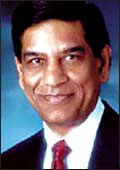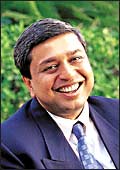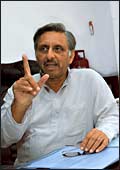|
HEADLINER
Karan Paul
ONE OF EVERY 10 TEA
Drinkers in the UK will now wake up to a cuppa served
by the Kolkata-based Apeejay Surrendra Group. Last fortnight,
the group, which is one of the largest exporters of tea to the
UK, acquired the Typhoo tea brand from Britain's Premier Foods
Plc for £80 million (Rs 632 crore), signalling its entry into
the branded tea market. Typhoo is the third largest tea brand
in the UK after Tetley and PG Tips, and has a packaging and blending
plant too at Moreton near Liverpool. "We were aggressively looking
for opportunities to grow-both in plantations and retailing of
branded products-so what could have been a better opportunity
than acquiring the iconic British brand?" asks Karan Paul, Apeejay
Group's 35-year-old Chairman. Apeejay, one of the largest tea
growers in the country with 17 estates and 21 million kg in annual
production, has acquired Typhoo through its international arm,
and Paul says the business will continue to be independent. The
process of acquisition is to be completed in a few weeks from
now and a new management team will be put in place to run the
show.
-Ritwik Mukherjee
Honda Revs Up
 |
| HMSI MD Yukihiro Aoshima: Top gear |
Japanese auto giant Honda is moving into
high gear. Barely months after a bloody workers' strike at its
Manesar (near Gurgaon) plant brought its low-profile scooters
business under the national glare, Honda Motor Scooters India
(HMSI) has announced plans of investing Rs 400 crore to triple
its annual production of motorcycles to 600,000. Rivals should
be worried. As it is, Honda is the largest motorcycle manufacturer
in the country through its joint venture with the Munjals. An
expansion, expected to go on stream by April 2008, would significantly
widen its lead.
Air Deccan Flying High
India's pioneering low-cost carrier, Air
Deccan, is going full thrust ahead. Soon after signing a sweet
deal with Vijay Mallya's Kingfisher Airlines for selling its excess
capacity on low-traffic routes for a reported Rs 2 crore (Kingfisher
needed those miles to meet regulatory norms), Deccan Aviation,
the carrier's holding company, announced the launch of Air Rescue
One, a critical care air ambulance service in association with
Delhi-based Escorts Heart Institute and Research Centre. A day
earlier it had announced the start of an in-flight shopping initiative.
 |
| BP India's Jhawar: Joining hands |
BP And HPCL Deal Time
BP (formerly British Petroleum) signed a
joint venture with Hindustan Petroleum Corporation Ltd (HPCL)
to enter the oil refining and marketing business in India. The
JV envisages setting up a nine-million-tonne refinery in Bhatinda,
Punjab, for $3 billion, although in the long run BP also wants
to enter oil exploration in the country.
NEWSMAKERS
THE VC BUG
 |
 |
| Strange bedfellows: Biyani
(left) and Gupta |
Opportunity,
it seems, is the mother of odd business partners. How else could
you explain the coming together of retail king and Pantaloon owner
Kishore Biyani and out-of-job former Coca-Cola India boss, Sanjiv
Gupta, to set up a retail and "consumption" sector fund
of $400 million (Rs 1,760 crore)? Neither of the men has known
the other for any long period of time, but both think the partnership
is perfect. "Sanjiv comes from a solid distribution background
and both of us are strong believers in the Indian consumer's growing
power to consume," says Biyani, whose retail-to-real-estate
empire includes the Pantaloon stores, the Big Bazaar chain and
Central malls.
The fund, which is yet to line up investors,
intends to invest in mid-sized companies in the food, fashion,
entertainment and media business. "We will give these companies
the capital needed to grow big enough to take advantage of the
consumption boom in India," says Biyani, adding that the
duo doesn't want to be known as venture capitalists (VCs), but
"mentor capitalists". The fund, when set up, will be
managed by Sanjiv, with Biyani playing the role of a sleeping
partner (we'll see about that). The retailer says that several
prospects have already been identified. But as anybody in the
VC business will tell you, identifying prospects is the easy part.
Handholding and grooming them to a stage where profitable exits
are possible, is the hard part. That's where even the best names
in the business trip up. Messrs Gupta and Biyani will, then, need
both patience and smarts to pull their fund off.
-Kushan Mitra
NUMBERS
OF NOTE
1 billion: Squatters in
the world today. Current projections show there will be 2 billion
squatters by 2030. By 2050, they will grow to 3 billion, more
than one in three people on the planet
$1.38 billion
(Rs 6,072 crore): Value of 62 overseas deals inked by Indian companies
so far this year
387%: Growth
in home theatre sales between January and August, according to
ACNielsen
Rs 39,891: Per
capita annual expenditure on household consumption at Kollam (district
in Kerala), even ahead of Pune at Rs 32,648
$790 million
(Rs 3,476 crore): Sale of digital music in the first six months
of the year, up from $220 million (Rs 968 crore) during the same
period a year earlier
$32 billion
(Rs 1,408,00 crore): Annual loss suffered by the software industry
to piracy. In the pharmaceuticals sector up to 10 per cent of
products worldwide are counterfeit, rising to as much as 50 per
cent to 60 per cent in the developing world
Rs 60,000 crore
($13.6 billion): Capital needed by India's banking sector to achieve
30 per cent annual growth through 2010; banks raised just Rs 3,000
crore between 2001 and 2004
 $432
billion (Rs 19,00,800 crore): The value of Asia-Pacific's entertainment
and media industries, driven by gains in China and India, by 2009.
The US would remain the largest media market at $690 billion (Rs
30,36,000 crore), according to PriceWaterhouseCoopers $432
billion (Rs 19,00,800 crore): The value of Asia-Pacific's entertainment
and media industries, driven by gains in China and India, by 2009.
The US would remain the largest media market at $690 billion (Rs
30,36,000 crore), according to PriceWaterhouseCoopers
$55 billion
(Rs 2,42,000 crore): Size of the global video game industry compared
to $25 billion (Rs 1,10,000 crore) in 2004
304 million-plus:
The number of households with DVD players in the world by 2009;
there will be 321 million households with broadband internet access
and 167 million ones with subscription TV
Yusuf
"Mr Generics" Hamied
The feisty drug maker plans to copy Roche's
avian flu drug-for a cause.
 |
| Cipla's Hamied: Mdicine
man |
Every
time Yusuf Hamied, the reclusive chairman of Mumbai-based drug
major Cipla, gets cheesed off about patented high-priced, but
life-saving, drugs, Big Pharma shudders. The last time he decided
to go after them, he launched aids drugs (known as anti-retro
virals, ARVs) for a fraction of the Big Pharma prices. This time
around, he's trained his sight on a drug that could save millions
of lives should the next big epidemic, the avian flu, hit mankind.
There's just one manufacturer, Roche, of the anti-influenza drug,
Tamiflu, and many experts expect a short supply should the bird
flu quickly spread around the world. "We'll do with Tamiflu
what we did with the aids drug," Hamied told BT over the
phone when contacted in Spain. "Somebody's got to do it."
At present, Cipla plans to be in a "state
of readiness" to manufacture a generic copy of the drug,
but the Swiss company will certainly take Cipla to court in the
case of a launch. In India, Tamiflu was filed with a "priority
date" of February 26, 1995, making its patent recognisable
under the new patent laws, which honour all patents filed after
January 1, 1995. But Hamied isn't mad at innovator companies like
Roche. He's mad at the Indian government, which agreed to recognise
patents filed after January 1, 1995, although the WTO provisions
allowed countries like India to do so starting January 1, 2005.
"I don't know how and why they did this (in 2000, under a
provision called exclusive marketing rights)," fumes Hamied,
who promises to make his copy of Tamiflu available at "humanitarian
prices".
-R. Sridharan
A NOTED
 Dismissed:
By a British court, a plea filed by Ranbaxy to annul pharma
giant Pfizer's main patent over its cholesterol-lowering drug Lipitor.
Judge Nicholas Pumfrey, however, handed Brian Tempest-led Ranbaxy
a minor victory by declaring invalid a second patent, which was
due to expire in 2011, a year later than the main patent. The court's
verdict, to be challenged by both Ranbaxy and Pfizer over their
respective defeats, means the Indian drug company cannot sell a
generic copy of Lipitor in the UK until 2011. A similar patent challenge
in the US is to be decided by the year-end. Dismissed:
By a British court, a plea filed by Ranbaxy to annul pharma
giant Pfizer's main patent over its cholesterol-lowering drug Lipitor.
Judge Nicholas Pumfrey, however, handed Brian Tempest-led Ranbaxy
a minor victory by declaring invalid a second patent, which was
due to expire in 2011, a year later than the main patent. The court's
verdict, to be challenged by both Ranbaxy and Pfizer over their
respective defeats, means the Indian drug company cannot sell a
generic copy of Lipitor in the UK until 2011. A similar patent challenge
in the US is to be decided by the year-end.
Ranked: Indian
Institutes of Technology (IITs) as third after MIT (Massachusetts
Institute of Technology) and the University of California at Berkeley,
by the Times Higher Education Supplement in London. The IITs now
leave behind other global technology institutions as Stanford
and Georgia Tech. University. The rankings are based on peer review
of 2,375 academics, who are involved in research, in areas like
science and technology, biomedicine and humanities.
Announced: The
2005 Nobel prize for economics. The award will be shared by two
game-theory experts-an Israeli, Robert J. Aumann, 75, of the Hebrew
University of Jerusalem, and an American, Thomas C. Schelling,
84, of the University of Maryland. The Nobel committee lauded
the pair for enhancing "our understanding of conflict and
cooperation through game-theory analysis".
 Bought:
By Shyam Bhartia's Jubilant Organosys, an integrated pharmaceuticals
company, a US-based clinical research organisation (CRO)-Target
Research Associates-in an all-cash deal for $33.5 million (Rs
147.4 crore). The first ever acquisition of a US CRO by an Indian
company makes Jubilant the largest Indian CRO having operations
in India and the US. Bought:
By Shyam Bhartia's Jubilant Organosys, an integrated pharmaceuticals
company, a US-based clinical research organisation (CRO)-Target
Research Associates-in an all-cash deal for $33.5 million (Rs
147.4 crore). The first ever acquisition of a US CRO by an Indian
company makes Jubilant the largest Indian CRO having operations
in India and the US.
Appointed: Retired IAS officer, Wajahat
Habibullah, as the first Chief Information Commissioner, under
the new Right to Information Act, which gives statutory rights
to citizens to obtain information from public authorities. The
new law will not be applicable in J&K.
A
BRACE OF KINGS
The man in the suit
is Lakshmi Mittal, the world's richest Indian; the man dressed
like a politician is the most powerful man in the state of Jharkhand,
its chief minister Arjun Munda. They're smiling because Mittal
Steel and the state of Jharkhand have just signed a deal for a
steel project. The picture is taken from a newspaper ad (one of
several) that Munda's government released the following day. That
should have helped those who missed the live telecast of the event
(well, it was treated as one) on an enterprising business channel.
It should also help Munda re-brand himself as the man who brought
the prodigal son back to India. Did we miss something? No, but
this magazine is missing a full-page ad.
MANI'S
DIKTAT
 |
| Petroleum Minister Aiyar:
Just blend it |
Agreed that biodiesel
is the need of the hour. But the Union Petroleum Minister Mani
Shankar Aiyar's diktat to public sector oil companies to start
buying biodiesel to blend with their regular diesel (in a 5:95
ratio) has left them in a bind. "Even if we were to blend
only 5 per cent of biodiesel, we will need more than 20 lakh tonnes
per annum," says a senior executive in an oil company. India
has an installed biodiesel capacity of 50 tonnes a day. But Leena
Mehendale, Joint Secretary, Petroleum Ministry and Executive Director
of Petroleum Conservation Research Association, says that demand,
and not supply is the issue. "Once the oil companies start
buying (biodiesel) on a regular basis, the capacities will be
increased," she says. Quality is another issue. If biodiesel
were to be sourced from disparate sources around the country,
monitoring and ensuring quality will be near impossible. "Oil
companies will have to install the equipment to check the standard
of supplies," says Mehendale. There's hope for the biodiesel
advocates yet. There's a lot of global interest in the sector.
The UK's d1 Oils, for instance, plans to set up an 8,000-tonnes-a-year
biodiesel refinery near Chennai by next year.
-Archna Shukla
|











 Dismissed:
Dismissed:
 Bought:
Bought:

